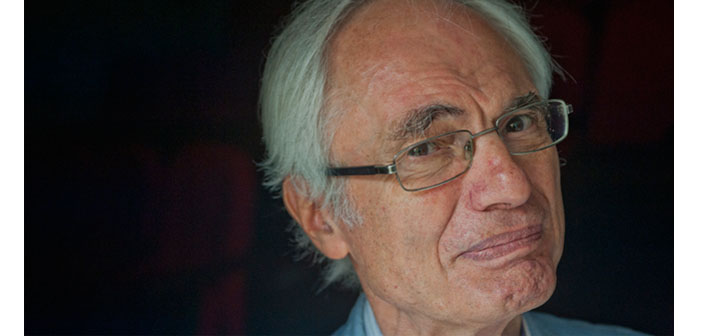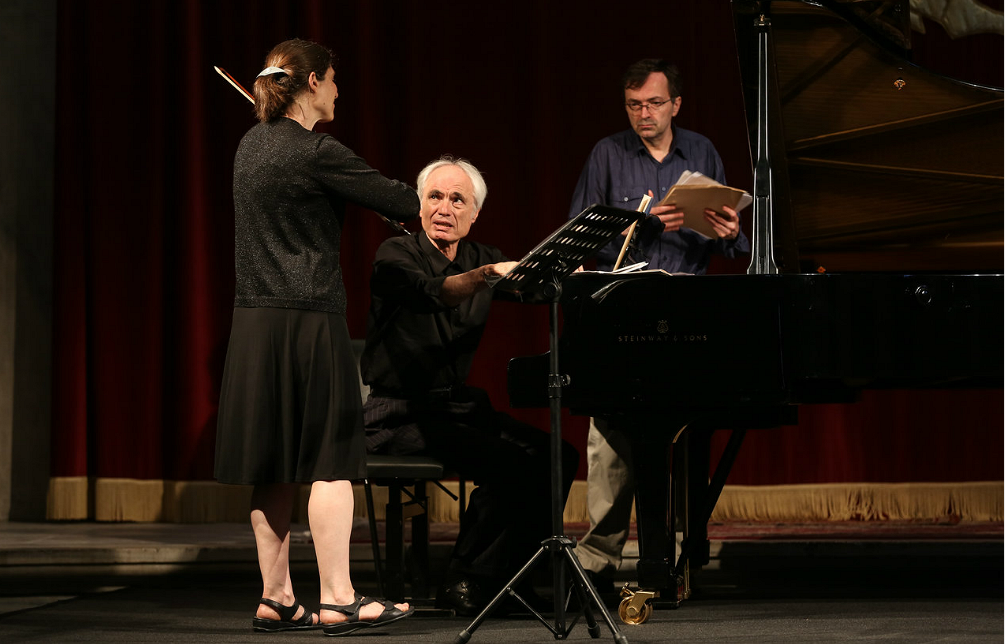Tigran Mansuryan: Ben Ermeni dilinin müzisyeniyim


43. İstanbul Müzik Festivali’ne özel olarak Mansurian tarafından bestelenen ‘Gomidas Vartabed’in Anısına Viyola ve Piyano İçin Kilise Sonatı’ adlı eserinin prömiyeri, 10 Haziran akşamı Surp Vortvots Vorodman Kilisesi’nde, ‘Kim Kashkashian & Péter Nagy ile Bir Dünya Prömiyeri’ başlıklı konserle yapıldı.
Mansuryan, bana dostu Paracanov’u, filmler için müzik bestelemeyi, ilk kez Türkiye’ye geliyor oluşunun üzerindeki etkilerini ve benim deha onunsa ‘hakikat’ olarak adlandırdığı yeteneğinin özünü, uzun uzadıya anlattı. Ne yazık ki, gazetemizin sayfa sınırları, bu sohbetin tamamını paylaşmamıza müsaade etmedi; gerisi bende saklı...
Yaşamınızla ilgili neler anlatırsınız bana?
Müzisyenim, beste yapıyorum. Romanos Melikyan Müzik Akademisi’nde dört, Gomidas Devlet Konservatuarı’nda beş yıl süren müzik eğitimimin ardındani, iki yıl doktora yaptım. Eğitim hayatımın tümü Yerevan’da geçti. Bölgeden, yani Sovyetler Birliği’nden gelen 60 kuşağı Rus, Estonyalı, Ukraynalı müzisyen arkadaşlarımın hepsi, bugün dünya çapında ünlü isimler. Ben de 60’lardan beri beste yapıyorum ve o zamanlar yaptığım besteler, bugün hâlâ yankılanmaya ve yaşamaya devam ediyor. Sovyetler’den çıkmam yasaklandığı için, uzunca bir süre bestelerimin seslendirildiği yerlerde hazır bulunamadım. Sovyetler çöktüğünden beri her yere gitmeye çalışıyorum. Artık benim de bulunabildiğim yerlerde bestelerim çalıyor. Halen Yerevan’da yaşıyorum. Ha, bir de ders vermiyorum.
Sovyetler’den dışarı çıkmanız neden yasaktı?
Bilmiyorum… Herhalde ideolojik olarak Sovyetler’le aynı tarafta olmadığım için. Dışarı çıkması yasaklanan, mimlenmiş adamlardan biriydim işte.
"Paracanov, en basit şeyleri bile öyle hallere sokardı ki… Onları yerden göğe yükseltir, gökten daha yükseğe taşırdı. Basit bir şeyden bile inanılmaz semboller üretir, onları sanatsal formlara sokardı. Ben Paracanov’un görüntülere yaptığı şeyi, sesler için yapmaya çalıştım."
Paracanov da yasaklıydı değil mi?
Evet aynı durumdaydık. Çok yakın dostumdu Paracanov.
Paracanov’la çalışmak nasıldı?
Paracanov bana ‘Nar’ın Rengi’nin müziklerini yapma işini verdiğinde 1969 yılıydı, 30 yaşındaydım. “Ben Kiev’e gidiyorum, bitirdiğinde dönerim” diyerek filmi verdi ve gitti. Filmde hiç ses yoktu, ama görüntü kısmı tamamlanmıştı. Üç ay boyunca her gün, sabah 9’dan akşam 9’a kadar çalıştım. Çok enteresan bir işti. Paracanov, en basit şeyleri bile öyle hallere sokardı ki… Onları yerden göğe yükseltir, gökten daha yükseğe taşırdı. Basit bir şeyden bile inanılmaz semboller üretir, onları sanatsal formlara sokardı. Ben Paracanov’un görüntülere yaptığı şeyi, sesler için yapmaya çalıştım.
"Film için beste yaparken çizgim tamamen değişiyor. Çünkü film için yaptığım müzikler aslında bana değil, filme ait ve her filmin de kendine has bir müziği var. Bu yüzden de filmden filme daha farklı bir insan oluyorum. ‘Nar’ın Rengi’nde başka, ‘Bir Parça Gökyüzü’nde başka biriyim."
Film için yaptığınız besteler, diğer bestelerinizden nasıl ayrışıyor?
Bambaşka bir iş bu. Film için beste yaparken çizgim tamamen değişiyor. Çünkü film için yaptığım müzikler aslında bana değil, filme ait ve her filmin de kendine has bir müziği var. Bu yüzden de filmden filme daha farklı bir insan oluyorum. ‘Nar’ın Rengi’nde başka, ‘Bir Parça Gökyüzü’nde başka biriyim. 100’den fazla film için müzik yaptım, hepsinde farklı işler çıkardım. Ama bana ait olan müzik, yıllardır aynı kaldı. Elbette bazı şeyler değişti, ama müziğimin özünün hep aynı kaldığını söyleyebilirim.
Bana besteciler “biraz deli, biraz dâhi” gibi geliyor. Siz öyle olduğunuzu söyleyebilir misiniz?
Kendimi dışardan görebilseydim, belki bir şey söyleyebilirdim. Bu mümkün olmadığı için sadece neysem oyum gibi bir şey diyebileceğim. Yine de bugüne kadar deli olduğumu söyleyen olmadı.
Yanlış anlamayın, sadece o seslerin zihninize gelişini tasavvur edemediğim için böyle düşünüyorum.
Hayır hayır, karşı çıktığım bir fikir değil bu, sadece dediğim gibi nasıl göründüğüme dair bir şey söyleyemiyorum. Ama üretmeye dair şunu söyleyebilirim: İçinde bir hakikat var ve o hakikat yaptığın işle buluştuğunda, doğru şeyler yaptığını biliyorsun. Örneğin, benim müziğimi bir ev olarak düşün, ben o eve giren kişinin kendini iyi hissetmesini, o evin bir parçası olduğunu düşünmesini istiyorum. Evin içinde altı kişiysek, yedincimiz o olsun. Yani evin hakikatini, o da benimsesin.
Şöyle sorayım; bu hakikatin kaynağı nedir?
Ermeni müziğini seviyorum. Kültürümüz çok eski zamanlardan bugüne kadar taşındı. Mesela 5. yüzyıldan olan ‘Anganimk’… ‘Anganimk’, beni 1.500 yıl geriye götüren bir ilahi. Bir saniyede, 1.500 yıl geriye gidip bu zamana dönüyorum. Bu yolculuk, benim zenginliğim. Ve devasa bir zenginliğe sahip bu yolculuğu, tarih boyunca bir sürü isim yaptı. Her birinin eseri, bu yolun üzerine işlenmiştir.
Buna ek olarak, bir müzisyenin konuştuğu dilin onun en büyük öğretmeni olduğuna inanıyorum. Sürekli bu dili konuşuyor ve duyuyorsun. Her dilin kendine has bir fonetiği, vurgusu var. Mesela bazı dillerde vurgu, kelimenin son hecesinde olur. Ermenicede bu böyle, Fransızcada da; Rusçada ise apayrı… Ermenice konuşan bir müzisyenin eserlerinde bu dile has etkiler görülür ve o müzisyen ‘Ermeni dilinin müzisyeni’ olur. Ben de Ermeni dilinin müzisyeniyim.
Bu durumda, özellikle bu topraklardaki halkları göz önünde bulundurarak soruyorum; Ermeni, Kürt veya Türk müziği gibi bir ayrım yapmak, yanlış olmayacaktır, öyle mi?
Evet. Müziğin dilden etkileniyor oluşu, benim için bir tartışma konusu bile değil. Ama yalnızca dil de değildir müziği etkileyen; bedenin hareketleri, nerede yaşadığın, nasıl yaşadığın da bu denklemin içinde yer alır. Dağlık bir yerde yaşıyorsan ona göre hareket edersin, yürüyüşün ona göre şekillenir, değil mi? Veya çölde yaşıyorsan daha farklı manzaralar çıkar karşına… Çölde yürüdükçe hep aynı şeyi görürsün ve bunun zihninde oluşturduğu bir fikir vardır. Sonra bir anda karşına bir ağaç çıkar ve bu manzara karşısında algın ve beyninin çalışma şekli değişir. Çevrendeki değişimler, senin müziğine de yansıyacaktır. Dilin ritmi kadar, doğanın ritmi de müziğinin üzerinde bir etki bırakır.

Herkesin klasik müzik dinlemiyor veya dinleyemiyor oluşuna ne diyorsunuz?
Müzik insanların isteklerine farklı şekillerde cevap vererek, onları çeşitli derecelerde tatmin eder. Sen, Tanrı olgusunu kavramak, Tanrı olmak, evreni ve gökyüzünü anlamak istiyor olabilirsin. Bunun tam zıttı olarak sadece yemek, yemenin tadına varmak, hatta bu keyfe bir de müzik eşlik etsin istiyor da olabilirsin. Müzikten beklentin neyse, dinlediğin müzik de o beklentinin çapı kadar oluyor.
Kutsal Kitap’ta “Çok bilgi, çok elem getirir” diye bir söz vardır. Yani insanlık, üzülmek istemediğinden, çok bilsin, her şeyi anlasın istemez. Bu yüzden kolayca dinlenebilen müzik tercih ediliyor. Mesela gençlerin büyük bir çoğunluğunun sevdiği müziği dinlemek kolaydır. Çünkü ritmin nasıl ilerleyeceğini bilirsin; baştan sona bum bum bum veya babum babum babum diye devam eder; belki üstüne ikinci bir ses gelir, la li la diye. Hiçbir şey değişmez, değişiklik olmayacağını bilmek güven verir sana. Ama klasik müzik, böyle değildir. Çeşitli niteliklerde, çeşitli müzikal formlar bir araya gelir ve hepsi aynı anda yürür.
İnsanlar önemli şeyler hakkında değil, basit şeylerle ilgili konuşmak istiyor artık. Zor olandan çekiniyor. Şimdilerde büyük sözler etmek de ayıp, gülüyorlar adama. Kolay bir hayat sürmek isteyenler için her şeyin kalitesi aşağı çekildi. Müzik de klasik müzikten uzaklaştı, kolay olana yaklaştı. Vaziyet bu yani; insan artık problemlerle uğraşmak değil, gönlünü hoş tutmak istiyor.
Geleceği nasıl görüyorsunuz?
Önümüzdeki yüzyılda devletlerin yok olacağını okudum. Yani insanlık kendi kendini nükleer silahlar yüzünden yiyip bitirmezse, bence hiç fena bir yolda değiliz.
Klasik müziğin geleceğini sormuştum aslında.
Eski yüzyıllarla karşılaştırdığımızda, daha çok eseri kayıt altına alabildiğimiz bir yüzyıldayız. Daha fazla insana ulaşıyor klasik müzik ve isteyen herkes büyük ustaların eserlerini dinleyebiliyor, bu güzel bir şey.
Yaşayan en büyük Ermeni besteci olduğunuz söyleniyor. Buna ne diyorsunuz?
Öyle diyorlar valla. Ben, benden daha büyük isimleri tanıdım ve onlar hayatta olmadığı için içim acıyor. Bir ben kaldım… Benim içinse büyük olanlar onlar.
Son olarak bu üç ismin size ne ifade ettiğini söyleyebilir misiniz? Gomidas, Aram Haçaduryan ve Tigran Hamasyan.
Gomidas, babamız; hepimizin babası. Bize dair ne varsa aldı getirdi, masaya koydu, “Aha işte bu biziz” dedi. Bütün dünya bunu gördü, Gomidas’ı keşfetmeye başladı ve bu keşif hâlâ devam ediyor.
Aram Haçaduryan, “Bir buçuk milyonu kaybettik, ama yaşamaya devam ediyoruz” demek için geldi. Ve bunu öyle bir sesle duyurdu ki, bütün dünya onu duydu, onu ve Ermeni müziğini tanıdı.
Tigran Hamasyan, çok tatlı bir müzisyen. Onun şarkı söyleyişi, beni Ermenistan’a götürüyor. İster piyanosuyla, ister sesiyle, artık ne kullanırsa kullansın o toprağın çocuğu olduğunu her defasında gösteriyor. Hafızası çok zengin biri. Böyle bir hafızaya nasıl sahip olur, aklım almıyor. Müzik mi ondan doğmuş, o mu müzikten belli değil…
‘Biz Türk bayrağını gördüğümüzde korkardık, şimdiyse dört yanım Türk bayrağıyla çevrili’
Beyrut’tan Yerevan’a geçişiniz ne zaman oldu?
1947’de. 8 yaşındaydım. O yıllarda Ermenistan’a dönüş başlamıştı, ailem de Ermenistan’a yerleşme kararı alan ailelerden biri oldu.
O hâlde aileniz Anadolu Ermenilerinden…
Annem Maraşlı, babam Diyarbakırlı, kıyımdan sonra yetimhanede tanışmış ikisi, Beyrut’ta da ev kurmuşlar. Annem çok inatçıydı. Maraşlıların inadını çok severim, bende de vardır o inattan.
1915’in size ifade ettiği şeyler nelerdir?
Biz dört kardeş, annemin anlattığı hikâyelerle büyüdük. Çok şey anlatmazdı, ama anlattığı kadarını hepimiz çok iyi anımsarız. Ama bunlar, şu anda konuşulacak veya hatırlanacak mevzular değil.
O zaman, Türkiye’ye ilk defa geliyor olmanın nasıl bir his olduğundan söz edin…
Dakika sayıyor gibiyim. Bir saat, sonra bir saat daha… Hiç kolay değil. Her bir anım, birbirinden ayrı. Bazen sakinim, bazen değil… Burada bir hafta kalacağım, zor olacak. Dedim ya, dakika sayıyorum. Gözümün önünde hiç alışık olmadığım görüntüler var. Biz Türk bayrağını gördüğümüzde korkardık; şimdiyse dört yanım Türk bayrağıyla çevriliyken bu korkunun gereksiz olduğunu görüyorum ve bu benim için yeni bir şey.
*Söyleşi esnasında Mansurian’la iletişimimi kolaylaştırdığı ve saatler süren bu konuşmanın Ermenice deşifrasyonunu kağıda döktüğü için kahramanım Vahakn Keşişyan’a binlerce kez teşekkür ederim.


